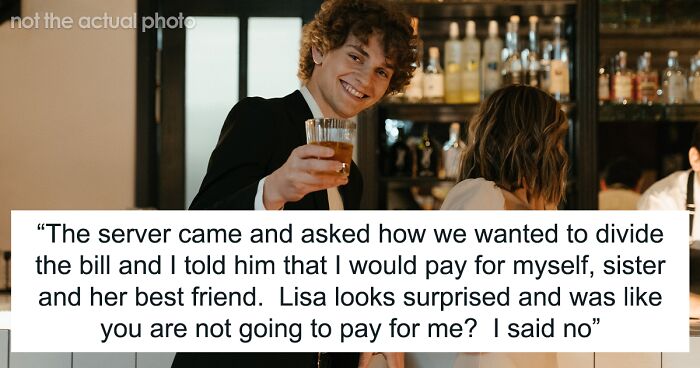
Woman Tries To Get Casual Date To Pay For Her Dinner With Friends, Gets Embarrassed And Blocked
Interview With ExpertIt’s quite a common topic to discuss who should pay for dinner on a date. Should the man or the woman pay, should they split, or does the one that invited cover the bill? There are many different opinions and I’m not sure if there is only one which is right. Also, it depends on the people – sometimes women agree that the man should be a gentleman and pay, some people want to split so nobody feels like they owe something. But what to do in a situation when people are just casually dating?
This is the situation one Reddit user found himself in. He was invited to dinner by a woman who he’s casually dating and he refused to cover her bill. She called him a jerk, meanwhile he doesn’t think he did something wrong.
More info: Reddit
It’s fair to want a man to pay for your dinner, but it’s important to understand at what stage of the relationship you are in
Image credits: Andrea Piacquadio (not the actual photo)
A man explained that he was casually dating this woman and had paid a few times for her drinks as it was only around $10
Image credits: Jep Gambardella (not the actual photo)
One day, while he was hanging out with his sister and her friend, he got an invite from this woman to join her and her friends for dinner
Image credits: Kampus Production (not the actual photo)
When it was time to pay, the man asked to cover his, his sister, and her friend’s bill as he was the one who invited them
Image credits: u/notapushie
The woman called him a jerk for not paying her tab as well, to which the man explained that she’s not his girlfriend and blocked her
A Reddit user shared his story on one of its communities asking folks online if he was in fact being a jerk for refusing to pay the woman’s tab at a friends’ dinner, since they were casually dating and she was the one who had invited him to join. The post received quite a lot of attention and collected over 1.6K upvotes and 386 comments.
OP starts by sharing that he is casually dating this woman, who he sees approximately one time per month. He adds that before they paid for themselves when they were eating with friends. The only problem was he had paid a few times for her drinks casually, which he emphasizes were around $10. But as it turned out – now she expected him to pay for her very expensive dinner.
So, back to the whole situation. One day, he was hanging out with his sister and her friend when he got an invite to join his ‘casual date’ and her friends for dinner. Now, when the time came to pay, OP explained that he would pay for himself, his sister and her friend, which left the woman stunned. He bluntly explained that they are not at that stage where he would shell out that much money for her.
Later on, he received a message from the woman telling him that he had embarrassed her, which understandably annoyed the author. He simply said that she was not his girlfriend and she could find another person to use to wine and dine her, and then he blocked her.
Community members gave the author the ‘Not the A-hole’ badge and discussed the whole situation. “Why do you think she invited you??? She wanted you to pay…If you asked her out, it would be expected that you pay. I’m all for equality, so if she asked you out, then she should be paying for you,” one user wrote. “She clearly invited you out to flex that her dinner would be paid for and it didn’t work. You’re no AH and you’re no fool,” another added.
Image credits: cottonbro studio (not the actual photo)
Bored Panda got in touch with dating coach Amie Leadingham, who kindly agreed to share her professional insights on splitting the bill in a casual dating scenario, how people can change traditional gender roles when it comes to paying for dates, and red flags to watch out for when it comes to a partner’s attitude towards splitting expenses when dating.
“Given the situation, Lisa did invite him out, and it wasn’t the other way around. So it would seem strange to have the expectation for him to pay for her dinner, especially if they are just casually dating,” Amie shares.
She adds that while it’s nice to have someone be chivalrous, it isn’t a requirement for anyone. Her disappointment is valid, but he may not be that invested in their relationship. Also, even if it’s not very kind, it’s okay for him to create these boundaries. “His actions show her where she stands with him and how their values around finances are not aligned in this scenario.”
Now, speaking about challenging traditional gender roles when it comes to paying, Amie emphasizes that rather than doing that, finding someone with the same values around money and spending is essential. “Some people are fine splitting the bill and, in fact, want to pay for themselves. Others want a more old-fashioned approach where the gentleman pays and they show their gratitude by giving back in other ways; both are absolutely okay as long as they both agree on those values,” she shares.
And finally, we asked Amie if there are any red flags to look out for when it comes to a partner’s attitude towards finances. She noted that if you have someone nitpicking at every penny you spend or someone who spends more than they can afford, both scenarios can be a red flag to look out for.
So guys, what do you think about this situation? Was the man doing the right thing by not paying for his casual date? Or the woman’s feelings were valid and he should have paid? Share your thoughts in the comments below!
Redditors backed the man and agreed that he did the right thing
Yes, in those times and cultures where women were/are barely allowed to earn of own their own money, a gentleman might be willing to pay. Since this situation does not seem to take place in either those times or those cultures, a gentleman might hold a door, pull a chair closer and act like a buffer between the women and certain kinds of danger: Money-wise, he's not obligated to anything.
Yes, in those times and cultures where women were/are barely allowed to earn of own their own money, a gentleman might be willing to pay. Since this situation does not seem to take place in either those times or those cultures, a gentleman might hold a door, pull a chair closer and act like a buffer between the women and certain kinds of danger: Money-wise, he's not obligated to anything.

 Dark Mode
Dark Mode 

 No fees, cancel anytime
No fees, cancel anytime 






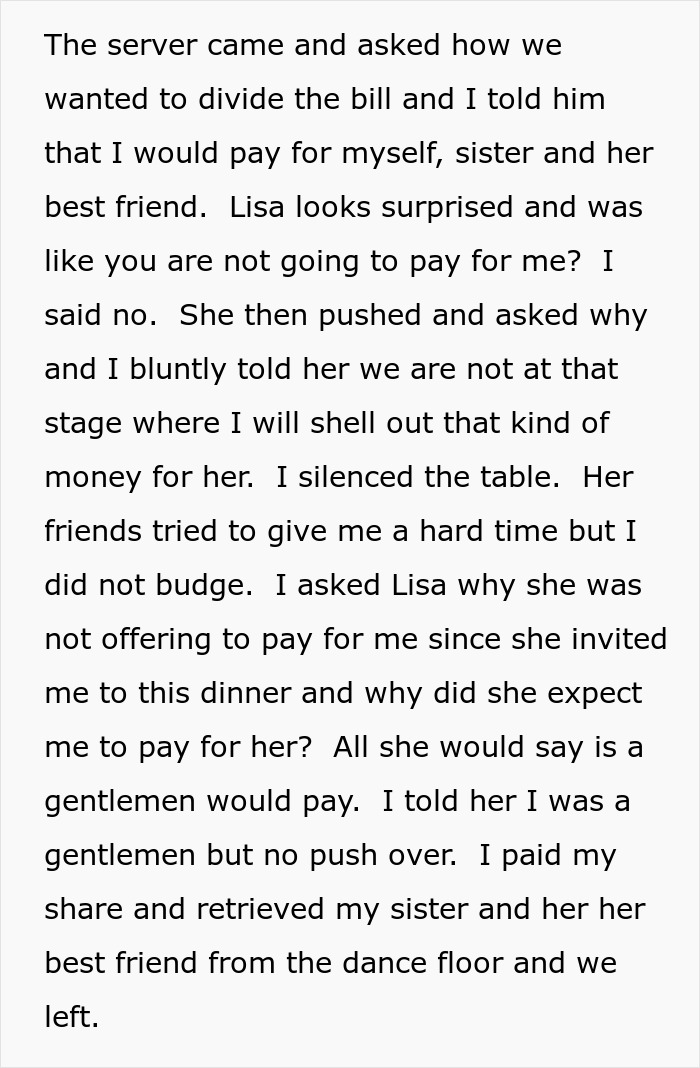



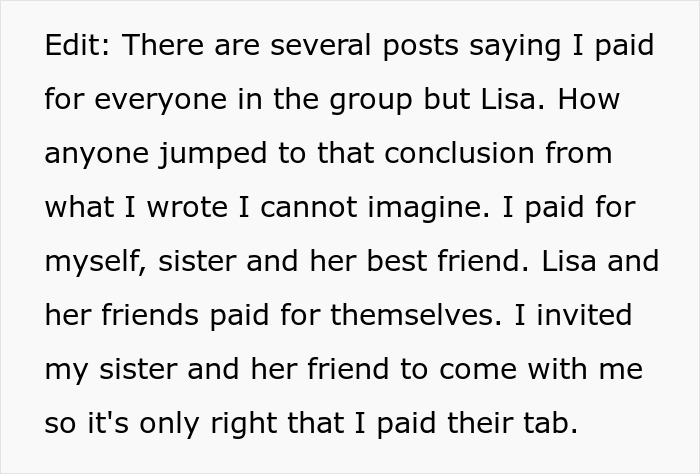

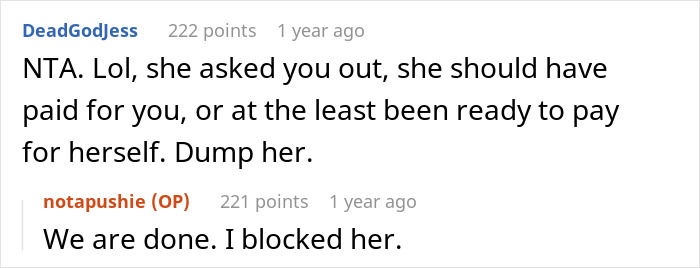



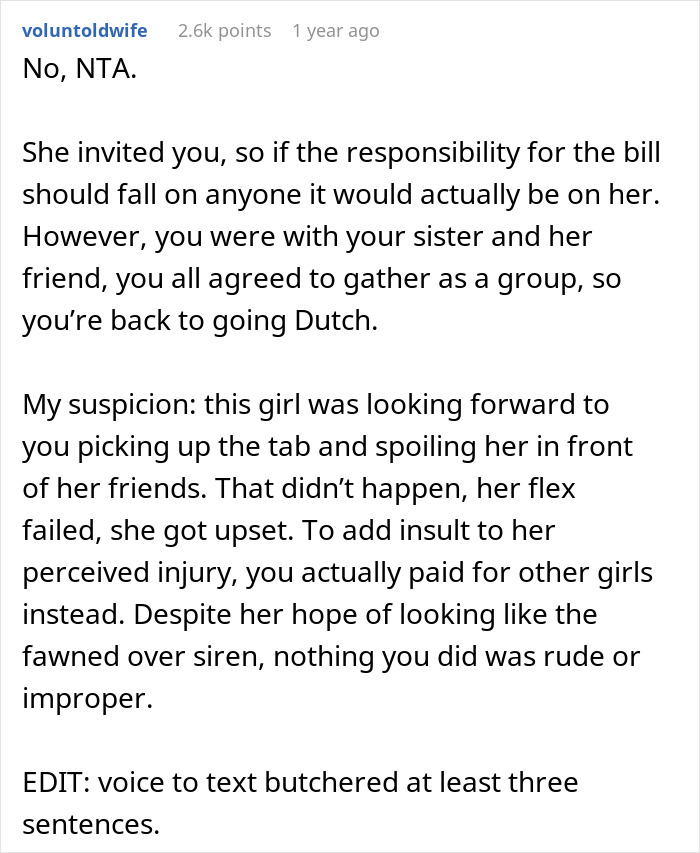
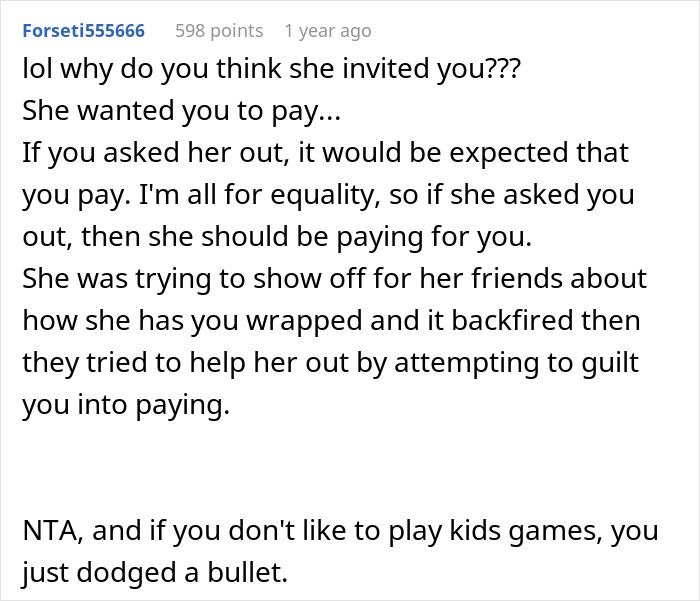

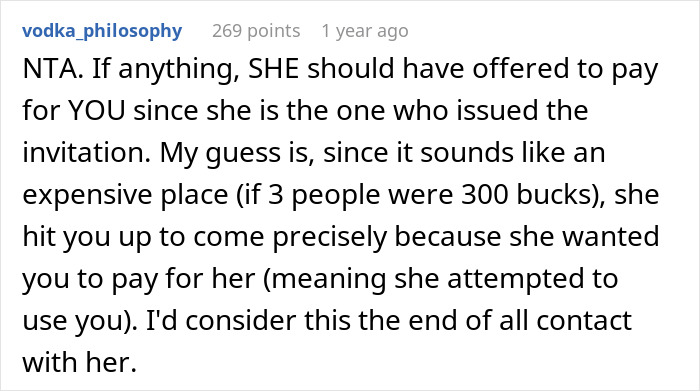
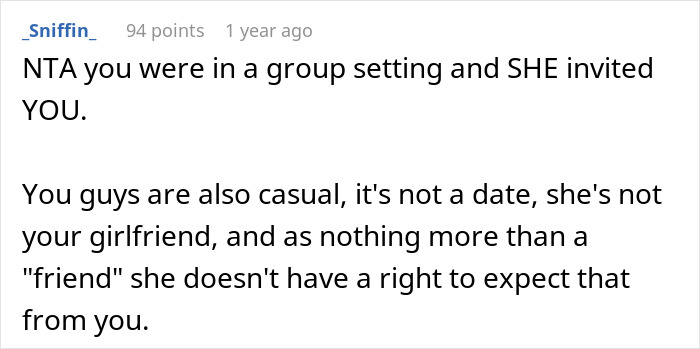

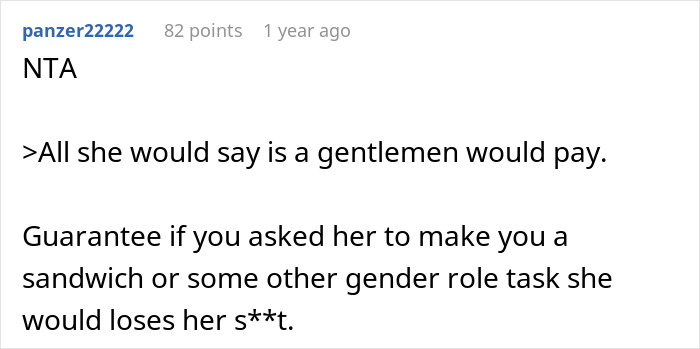












































77
27